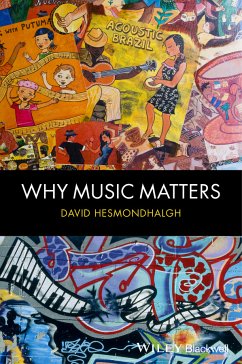Listen to David Hesmondhalgh discuss the arguments at the core of 'Why Music Matters' with Laurie Taylor on BBC Radio 4's Thinking Allowed here: www.bbc.co.uk/iplayer/episode/b03q9q2n/Thinking_Allowed_Why_Music_Matters_Bhangra_and_Belonging/ In what ways might music enrich the lives of people and of societies? What prevents it from doing so? Why Music Matters explores the role of music in our lives, and investigates the social and political significance of music in modern societies. * First book of its kind to explore music through a variety of theories and approaches and unite these theories using one authoritative voice * Combines a broad yet theoretically sophisticated approach to music and society with real clarity and accessibility * A historically and sociologically informed understanding of music in relation to questions of social power and inequality * By drawing on both popular and academic talk about a range of musical forms and practices, readers will engage with a wide musical terrain and a wealth of case studies
Dieser Download kann aus rechtlichen Gründen nur mit Rechnungsadresse in D ausgeliefert werden.
"Many of us who love popular music call ourselves 'poptimist' these days without bothering to establish a theoretical framework that would make that catchy term meaningful. In this slim, lucid, infinitely deep book, David Hesmondhalgh offers a way into that process. His conclusions about music's impact on our personal and social lives have already become essential to my own work, and any music scholar, critic, musician or fan will benefit from his calm, clear, uncompromising voice." -- Ann Powers, Pop Music Critic, National Public Radio
"This is also about why freedom, solidarity and love matter. Hesmondhalgh's wide-ranging and thought-provoking study sets the agenda for musicology's latest affective turn." -- Martin Stokes, King's College London
"This is also about why freedom, solidarity and love matter. Hesmondhalgh's wide-ranging and thought-provoking study sets the agenda for musicology's latest affective turn." -- Martin Stokes, King's College London
"Most notably the book is ambivalent about much of the promises claimed by the advocates of music's transformative potential, but is never bleak, retaining a refreshing realism about the capacity of music to matter to people, publics and nations across the world." (New Books In Critical Theory, 19 June 2014)









